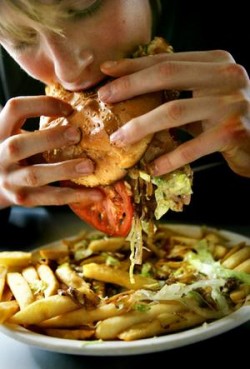Understanding the Symptoms of Compulsive Overeating Disorder
Compulsive overeating disorder, also called binge eating disorder, is an eating disorder just as anorexia and bulimia are. Many people do not understand the implications and symptoms of compulsive overeating disorder, and they sometimes do not realize that it is just as problematic, unhealthy, and uncontrollable as the previous disorders mentioned. It is important to understand the symptoms of compulsive overeating disorder.
What is Compulsive Overeating Disorder?
Compulsive overeating disorder is also often called binge eating disorder. According to the OWH, “people with binge eating disorder often eat an unusually large amount of food and feel out of control during the binges.” This happens to people who suffer from bulimia as well, although those with compulsive overeating disorder do not attempt to compensate for their overeating by exercising, throwing up, or other means. This can cause those with compulsive overeating disorder to be overweight or obese.
Symptoms of Compulsive Overeating Disorder

Compulsive overeating makes people continue to eat despite being full.
Some of the physical symptoms and health effects caused by compulsive overeating disorder are:
- Obesity
- Gallbladder disease
- High cholesterol and blood pressure
- Type 2 diabetes
- “Certain types of cancer”
According to the NIMH, “people with binge-eating disorder who are obese are at higher risk for developing cardiovascular disease.” The disorder can become very dangerous to a person’s health.
Some of the behavioral symptoms of compulsive overeating disorder are:
- Eating “until… uncomfortably full”
- Eating when not actually hungry
- Eating alone due to embarrassment
- Feelings of guilt, shame, depression, or disgust before, after, and during overeating
- Eating very quickly when binging
Causes of Compulsive Overeating Disorder
Compulsive overeating disorder might have many causes, depending on the life, background, family history, and mental state of the individual. Many times, compulsive overeating disorder, as well as other eating disorders, occur along with other mental health conditions. The OWH states that “as many as half of all people with binge eating disorder are depressed or have been depressed in the past.” This provides insight toward many of the symptoms of compulsive overeating disorder, such as the massive guilt that is often involved in overeating.
Some people have trouble coping with their emotions and other stressors in their lives. They eat in order to suppress emotions they do not want to feel such as sadness, anger, anxiety, or loneliness. Many individuals feel that their compulsive overeating disorders are tied heavily to their emotions. Feelings of isolation also sometimes go along with compulsive overeating disorder.
Biology is another factor in compulsive overeating disorders. “Research also suggests that genes may be involved in binge eating, since the disorder often occurs in several members of the same family” (OWH).
Understanding Compulsive Overeating Disorder Symptoms
Many of the symptoms of compulsive overeating disorder are caused by a desire to control or suppress emotions or troubling thoughts. Mental disorders also go hand-in-hand with compulsive overeating disorder. The physical symptoms manifest because of the unhealthy weight of the individual, caused by overeating.
Although this seems controllable to many people, compulsive overeating disorder is something that the individual cannot control. While people can seek treatment and even make a full recovery, compulsive overeating disorder causes symptoms that are not always immediately treatable, and the disorder often means the presence of another mental disorder or mental health issue.





